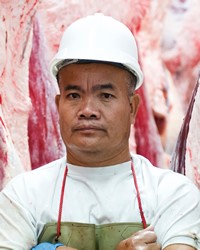Burakumin in Japan

Photo Source:
Copyrighted © 2026
Somchai Stock - Shutterstock All rights reserved. Used with permission |
Send Joshua Project a map of this people group.
|
| People Name: | Burakumin |
| Country: | Japan |
| 10/40 Window: | Yes |
| Population: | 864,000 |
| World Population: | 864,000 |
| Primary Language: | Japanese |
| Primary Religion: | Buddhism |
| Christian Adherents: | 0.50 % |
| Evangelicals: | 0.20 % |
| Scripture: | Complete Bible |
| Ministry Resources: | Yes |
| Jesus Film: | Yes |
| Audio Recordings: | Yes |
| People Cluster: | Japanese |
| Affinity Bloc: | East Asian Peoples |
| Progress Level: |
|
Introduction / History
The Burakumin descendended as part of the outcasts from Japan's feudal system. The name Burakumin means "hamlet people." During Japan's feudal days the Burakumin were placed into two groups; the eta "defiled ones/filthy commoners" or the hinin "non-humans." The eta held jobs which revolved around death. Shinto/Buddhist religions identify death with defilement; therefore, the Burakumin were identified as defiled. The second hinin group included ex-convicts, prostitutes, beggers, and low-level entertainers. The group was identifited as the lowest of the low in society.
In the early 18th century the Burakumin were given several social rules about what they could wear, where they could go, and how long they could be out. In 1871 the "Emancipation Act" was passed that abolished the feudal system, but no laws were passed to end the discrimination against the Burakumin. In the 1900s several groups formed to fight for Burakumin rights.
What Are Their Lives Like?
Today many Burakumin have assimilated into Japanese culture; however, there are still around 4,000- 6,000 Burakumin communities (depending on which source you use). The total population in these communities is around 1-3 million people. The settlements are located in mainly rural areas. The Burakumin face some discrimination in marriage and employment. The discrimination is mostly seen in the western areas of Japan.
What Are Their Beliefs?
The Burakumin trained their own Buddhist and Shinto priest and also produced unauthorized practitioners of both religions and other folk religions. The Burakumin used diviners and ceremonial performers. Early Christian missionaries were drawn to the Burakumin because of their evident needs and persecution. During this time some became followers of Christ.
Prayer Points
Pray that the Burakumin would find their identity in Christ.
Pray for a church planting movement among the Burakumin communities.
Pray for Japanese hearts to change so that discrimination toward the Burakumin would be eliminated.